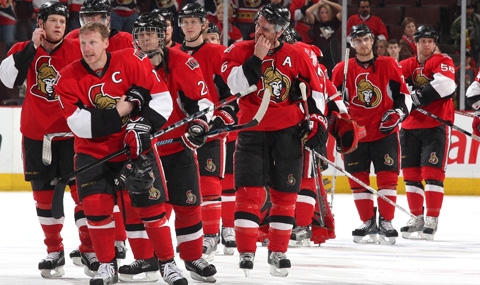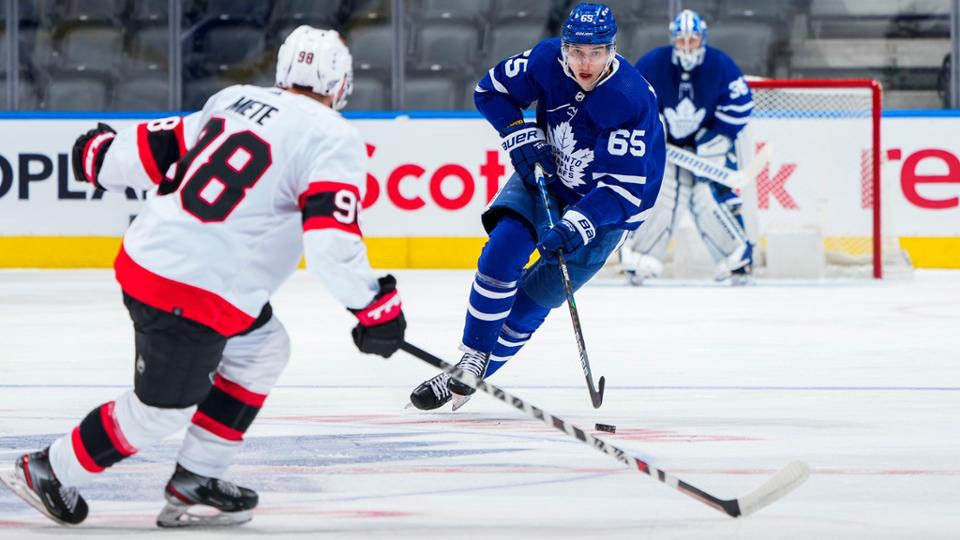
Senate Reform, Part X: The End of the Beginning
Now it all makes sense.
You bleed for your team, you follow them through thick and thin, you monitor every free-agent signing, you immerse yourself in Draft Day, you purchase the jerseys and caps, you plan your Sundays around the games… and there’s a little rainbow waiting at the end. You can’t see it, but you know it’s there. It’s there. It has to be there. So you believe.
Of course, there’s one catch: You might never get there. Every fan’s worst fear. All that energy of the years just getting displaced, no release, no satisfaction, nothing. Season after season, no championship… and then you die. I mean, isn’t that what this is all about? Isn’t that the nagging fear? That those little moral victories over the years won’t make up for that big payoff at the end – that one moment when everything comes together, when your teams keeps winning, when you keep getting the breaks and you just can’t lose.
Bill Simmons is one of my favourite sportswriters. He’s from Boston, originally; he wrote the above passage in 2002, nine years before the Bruins won their first Stanley Cup in 39 years, six before the Celtics won their first championship in 22 years, two before the Red Sox snapped their 86-year title drought and one day after the Patriots won their first Super Bowl. Writing for ESPN.com, his words could have applied to any team hoisting their first championship trophy, to any fan experiencing their team’s first championship.
Before being bound to impartiality, every sportswriter was a fan of something; they were either born into fandom or adopted a team as their own based on a number of reasons – a transcendent player, a captivating colour scheme, the birth of a franchise in their backyard. Their proclivity for analysis and criticism was born from a love for the game, following their team day in and day out and living and dying with the outcome.
Simmons is far from impartial, though he manages to toe the line between columnist and cheerleader. Unabashedly biased towards the Boston teams, he’s still thoughtful enough to expound on the highs and lows of any sports franchise. While over the top, the nostalgic adoration he shows for his hometown clubs can be endearing – a West Coast convert unwilling to abandon the teams he left behind.
In a column posted on February 4, 2008, Simmons opened with these exact same three paragraphs – only this time, his Patriots had been upset in the Super Bowl to the New York Giants. He’d been to the mountaintop three times over with the Pats, in 2002, 2004 and 2005, only to see it finally come crashing down. In every sport, for every championship and every heartbreak, there’s always a tomorrow.
This is going to be the final piece in the Senate Reform series, and I hope you’ll excuse the fact that the storyline is centered primarily around me. If you’re a Sens fan, it’s about you, too – just intersperse your memories and experiences where mine are below.
I was born in 1992; December, to be exact, two-and-a-half months after Neil Brady scored the first goal in the history of the modern Ottawa Senators. The first game played after my birth came on New Year’s Eve, a road date with the Detroit Red Wings. Fittingly, the Sens lost, their 34th defeat in 40 games and the 12th game of a winless streak that would last 15.
Over the next four seasons, the losses would mount, resulting in the firing of the team’s first coach, Rick Bowness, who would be followed out the door by his successor, Dave Allison, just two wins and 25 games later. The tide would turn soon after, however, with Jacques Martin leaving the Colorado Avalanche to take over as Ottawa’s head coach. In 1996-97, the Senators would reach the playoffs for the first time, due in no small part to the contributions of young players such as Radek Bonk, Wade Redden, Alexei Yashin and Daniel Alfredsson.
Ottawa never missed the playoffs in any of Martin’s eight full seasons behind the bench, with Chris Phillips, Marian Hossa, Mike Fisher, Martin Havlat and several other impact players joining the team in the next few years. From their modest beginning as an expansion franchise, the Sens gradually evolved into a juggernaut. With Bonk, Hossa and Alfredsson leading the charge up front, Redden, Phillips and Zdeno Chara providing strength on defense and Patrick Lalime manning the crease, Ottawa won three division titles and captivated an entire generation of young fans.
The Hossa/Alfredsson/Redden core would peak in the early 2000s, culminating in the Eastern Conference Finals run in 2003. The emergence of players like Fisher, Chris Neil and Jason Spezza and the decision to trade Hossa to Atlanta for Dany Heatley bought the core a few more years, and the team responded by rolling through a weak Eastern Conference and reaching the Cup final in 2007. They would be swiftly dismissed by Anaheim, however, and the wheels would fall off soon after.
Over the next four years, Ottawa’s goaltending carousel continued, the effects of John Muckler’s decimation of the team’s prospect pool were felt and stopgap solutions like Alexei Kovalev and Sergei Gonchar failed to pay dividends. Two playoff appearances would follow in the next three years, but the Sens were ousted by Pittsburgh in the first round on both occasions. It wasn’t until the team’s 1-17 run in January 2011 that several key veterans were dealt away and the rebuild was set in motion.
Slowly but surely, the 2006-07 Cup finalist team has been dismantled. Ray Emery missed practice, drove too fast and was exiled to Russia; Redden vanished from the face of the Earth and reemerged as a Connecticut Whale; Anton Volchenkov and Andrej Meszaros became too expensive to retain; Fisher was sent to live with Carrie Underwood in Nashville; Chris Kelly hoisted the Cup as a Boston Bruin; and Heatley made Ottawa fans forget about Alexei Yashin’s NAC donation fiasco. Only four men remain from four years ago: Neil, the ever-faithful pugilist; Spezza, the former boy wonder; Phillips, the steady second-in-command; and Alfredsson, the captain of the sinking ship.
These four have been chose to usher the Ottawa Senators back into contention. They’ll be assisted by a pair of youngsters who have already stepped into veteran roles: reliable winger Nick Foligno and offensive dynamo Erik Karlsson. Soon, the next legion of Senators will feature names like Rundblad, Cowen, Zibanejad, Silfverberg, Da Costa, Butler, Wiercioch and Lehner.
Soon, they’ll be privy to our team’s brief, momentous history. There have been playoff failures: Derek Plante’s goal, Ricard Persson’s lapse in judgment, Ed Belfour’s heroics, Jeff Friesen’s dagger, Joe Nieuwendyk’s floaters, Jason Pominville’s breakaway, the collective will of the Anaheim Ducks. There have been good memories through the years. Without a Cup, the losses are the ones that will be rehashed, continuously, until the city can finally savour its championship.
This piece was posted on a Monday. Early Sunday morning, I said goodbye to my hometown and my hometown team, embarking on the long drive down the 417, moving away for university. I’ve been alive eighteen years – eighteen years of energy being displaced, no release, no satisfaction. That can’t be true, though – we were here for the Cup run of 2007, when the Sens seemingly couldn’t lose, when the Sens Mile stretched from Kanata to Elgin Street and all the way through the East End. It didn’t work out here for Hossa, for Redden, for Yashin, for Lalime, for Chara, for Havlat, for Martin, for Fisher, for Kelly, for Heatley, and tragically, it won’t work out for Alfredsson. We’ve grown up together, the team, the city and I, and while the years following the magical run of 2007 seem to have signalled the beginning of the end, we know that can’t be true, either – not with a new beginning right around the corner.
I’ll be back in eight months. Someday, the Sens will be, too.









